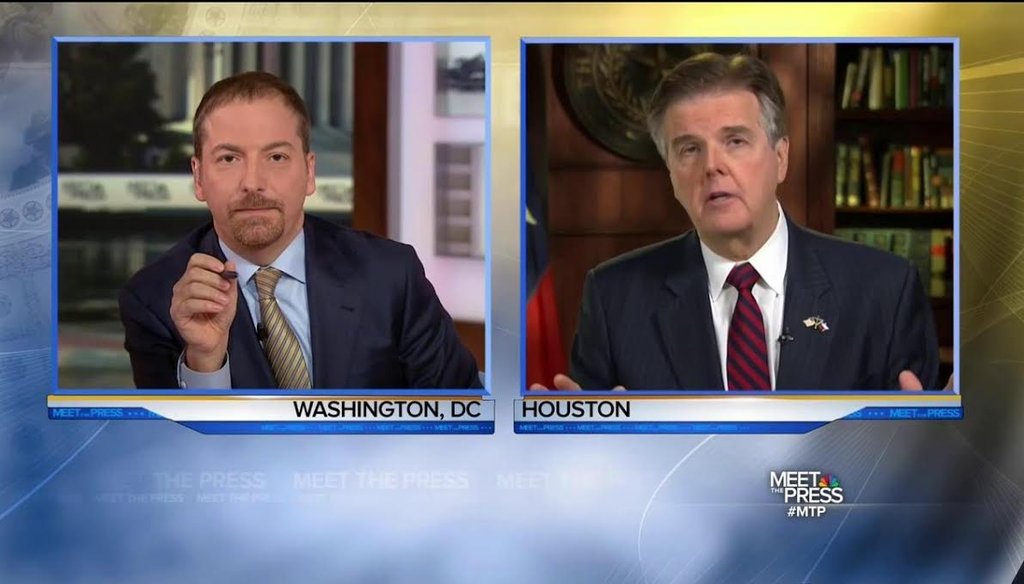Stand up for the facts!
Our only agenda is to publish the truth so you can be an informed participant in democracy.
We need your help.
I would like to contribute

NBC's "Meet the Press" moderator Chuck Todd questions Texas Lt. Gov. Dan Patrick about his state's new open carry law. (NBC photo)
With the holidays in the rearview, journalists and politicians Sunday plunged into all-out coverage of the 2016 presidential race. On the Republican side, that soon led to criticism of Florida Sen. Marco Rubio, delivered by fellow senator Rand Paul of Kentucky.
Paul hasn’t hosted a public campaign event since Dec. 16 in Nevada. On NBC’s Meet the Press, host Chuck Todd asked Paul where he’s been.
Doing his duties in the senate, unlike Rubio, Paul replied. Paul also took aim at fellow presidential candidate Sen. Ted Cruz, R-Texas.
"I mean, I have a job as senator," Paul said. "I'm one of the few of the candidates that actually shows up to vote. Both Cruz and Rubio are missing the vast majority of their votes. But I feel an obligation to the taxpayer that pays my salary."
Paul far overstated when he said Cruz and Rubio missed "the vast majority of their votes." We rated the statement Mostly False.
Paul used his busy Senate schedule as an excuse for not hosting many campaign events in the latter half of December, but there wasn’t actually too much going on at Capitol Hill during this time. The Senate has been in recess since Dec. 18 and won’t be back in session until Jan. 11.
Paul’s campaign sent over data for missed voters over the Senate careers of Paul, Cruz and Rubio, which we corroborated on the website GovTrack.
Concerning their career absentee rates, Rubio has the worst record, missing 13.3 percent of all votes. He’s followed by Cruz at 12.4 percent and Clinton at 9.5 percent. Paul has missed closer to 4 percent, just above Sen. Bernie Sanders, I-Vt., who is running for the Democratic nomination.
However, no candidate has missed a "vast majority" of votes over his career.
The story shifts if you look at recent months. (We chose October through December because GovTrack breaks its data into three-month periods.)
Rubio did miss a majority of his votes in that timeframe, skipping 39 out of 67 total votes, or 58 percent. Rubio missed a biggie on Dec. 18, the finale vote on a major spending bill that Cruz and Paul voted against. However, Cruz did not miss a majority of his votes in that time period, missing 29.8 percent compared to Paul’s 20.9 percent.
Neither Cruz nor Rubio missed a majority of votes in 2015 overall.
More guns, lower crime
Murmurs of looming executive action on gun control from President Barack Obama also dominated the Sunday conversation, with conservative pundits and politicians decrying any unilateral moves.
Texas Lt. Gov. Dan Patrick touted the new law in his state that allows Texans with concealed carry permits to openly carry their weapons in most public areas. Patrick argued that laws like this actually make states safer.
"Everywhere that we have more citizens carrying guns, crime is less," Patrick said. "There's a study showing that where states have open carry or concealed carry, but particularly open carry, the crime is down 25 percent. Murders are down. Having law-abiding citizens having guns is a good thing."
The evidence for such a sweeping statement, we found, is lacking. His claim about concealed-carry permits coinciding with crime decreases rates Mostly False.
Patrick did not get back to us by deadline, but he could be referencing one study by economist John Lott, president of the pro-gun Crime Prevention Research Center, and flubbing some of the details.
Lott’s research — which was not published in a peer-reviewed journal but on the Crime Prevention Research Center’s website — looked at the increase in concealed-carry permits but did not discuss open carry, as Patrick mentioned. And the 25 percent refers to a decrease in murder rates across the nation as well as a decline in violent crime.
According to the study, the number of concealed-handgun permits across the country has increased by 178 percent from 4.6 million to 12.8 million from 2007 to 2015. Meanwhile, national murder rates have fallen from 2007 to 2014 by 25 percent, from 5.6 to 4.2 homicides per 100,000.
"Overall, violent crime also fell by 25 percent over that time period," Lott writes, though he doesn’t give the numbers behind this rate in the study.
A peer-reviewed study in the Journal of Criminology directly refuted Lott’s findings (and Lott in turn refuted that research). Researchers at Texas A&M University looked at county-level crime data in Florida, Michigan, Pennsylvania and Texas from 1998 to 2010 — the only four states with at least a decade’s worth of data after concealed-carry legislation was passed.
While all the states saw an increase in the amount of concealed-carry permits, the crime trends varied. Rape and burglary decreased across all four states from 1998 to 2010, and murder decreased in Michigan and Texas. However, robbery, aggravated assault and larceny increased in Michigan and Pennsylvania while murder increased in Florida and Pennsylvania.
"We found no effect of increases in (concealed-carry permits) issued in a county on changes in crime rates," Charles Phillips, a public health professor at Texas A&M and lead author of the study, told PolitiFact.
Our Sources
See fact-checks.


















































